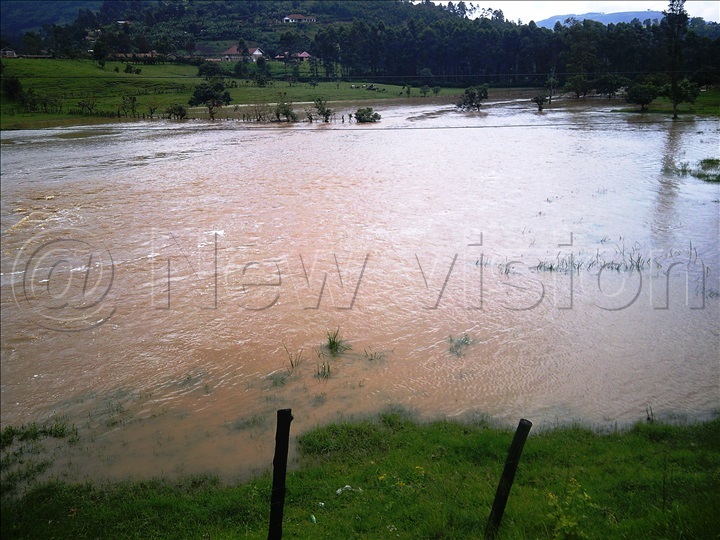Govt restores river catchment areas
“People have planted eucalyptus trees in river buffer zones, a lot of cultivation and farming is being done along the rivers. This could be the reason behind the undesirable climatic challenges we are encountering of late,” he said.
The Ministry of Water and Environment has started the restoration of selected rivers in south-western Uganda.
The activity is being done with the support from the Adaptation Fund, through the Sahara and Sahel Observatory for implementing the Enhancing Resilience of Communities to Climate Change through Catchment- Based Integrated Management of Water and Related Resources in Uganda (EURECCCA) project.
According to Louis Mugisha, a senior water analyst in the ministry's directorate of Water Resources, the project that started in 2017 is now in its final stages, and that the rivers that will be restored fall under the Maziba catchment area.
In this project, the government is restoring rivers Kiruruma in Kabale, Rufuha in Ntungamo and Kashenyi Nyamiyaga-Bubaare stream in Rubanda district.
"We are now showing people the extent of these rivers so that whatever is done within their buffer zones is in accordance with the law. If the buffer zones were protected, we would not be having dirty water. What our people are consuming now is unfiltered water, which is not safe at all," he said.
Dennis Singahakye, the Ntungamo district LC5 chairperson who also heads the Maziba catchment area committee, said human activity has caused a lot of destruction on most rivers in the region.
"People have planted eucalyptus trees in river buffer zones, a lot of cultivation and farming is being done along the rivers. This could be the reason behind the undesirable climatic challenges we are encountering of late," he said.

Singahakye said southwestern Uganda has been registering several landslides, floods and some people have lost their crops and lives to the effects of climate change, which, he said, are caused by their own mistakes.
Rogers Akatwijuka, the Kabale district natural resources officer, said due to the poor land use around Maziba river, the Maziba hydropower dam is silted and is no longer operational.
He added that the effect of global warming is hitting the region badly, but a serious effort can see positive results realised.
Akatwijuka also noted that due to the ever-changing conditions, there has been a visible reduction of the crested crane birds in the area. "Crested cranes cannot keep surviving when wetlands, which are their breeding grounds, are no more.
"Remember these birds are the source of our national pride, but if we keep like this, we could also lose them," he added.
Residents Recount losses Amos Nsemerirwe, 56, a livestock farmer in Nyakijumba because cell, Central division in Kabale municipality, will never forget how he lost three cows after a downpour in September 2018.
Nsemerirwe's farm is located a few metres from Kiruruma River and the loss was encountered when the river flooded.
"I was home, planning to check on my cattle because the afternoon milking time was drawing closer.
"The skies started changing and, before I realised, it started pouring. The rain stopped after four hours and when I made my way to the farm, over 70% of this land was covered by floods from the river," he recalls.
Nsemerirwe looked for his animals and found them taking refuge at one corner of his farm.
However, three cows were nowhere to be seen. These were later discovered dead two days after the floods had dried up.
"I thought of selling my farm because of the disappointment. I knew that disaster would come my way any other time. I will always remember this unexpected loss," he said.
In September 2017, Sauda Ankunda, a 20-year-old resident of Ruyumbu cell, Kitunga parish in Kashambya sub-county, was killed by lightning during a downpour in Kashambya sub-county, Rukiga district.
She was a student in Senior Three at Kabale Trinity College. According to the Kashambya sub-county chairperson, Elineo Bandaganiire, the same rains also claimed much livestock and destroyed several gardens in Kitanga, Rushebeya, Kyehinde and Bucundura areas in Kashambya sub-county.
Around the same time, 13 people were killed when landslides hit Rubanda district in the sub-counties of Muko, Nyamweru, Ikumba, Ruhija and Bufundi.
In May this year, two children — Everist Ahimbisibwe, 9 and Cleo Amanya, 4 — both daughters of Julius Atwine, were killed by the mudslides in Karengyere village, Rubanda district.
Heavy rains also pounded Maziba sub-county in Kabale district, destroying many buildings, including Maziba Primary School.
According to Samuel Ngambe, a resident of Maziba, more destruction was seen in the villages of Kambibi and Rwabakyina, while 22 houses were swept off and plantations destroyed in Kaharo sub-county.